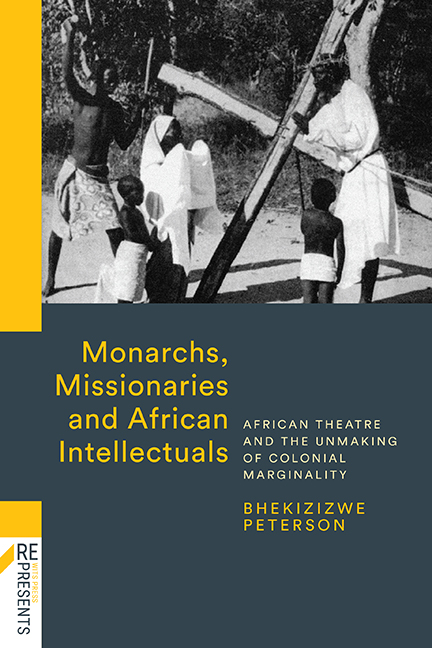 Monarchs, Missionaries and African Intellectuals
Monarchs, Missionaries and African Intellectuals Book contents
- Frontmatter
- Dedication
- Contents
- Preface and Acknowledgements
- Note on Zulu Orthography
- Introduction: Staging the (Alien)nation: African Theatre and the Colonial Experience
- 1 ‘All Work and No Play Makes Civilisation Unattractive to the Masses’: Theatre and Mission Education at Mariannhill
- 2 ‘I Will Open My Mouth in Parables’:Accounting for the Crevices in Redemption
- 3 Parallel Time, Parallel Signs, Discordant Interpretations
- 4 B.W. Vilakazi and the Poetics of the Mental War Zone
- 5 The Bantu Men’s Social Centre: Meeting the Devil on his own Ground
- 6 The Bantu Dramatic Society According to a Gossip Columnist
- 7 Contesting ‘The Bantu Imagination’: The British Drama League & The New Africans
- 8 H.I.E. Dhlomo: Measuring the Distance Between Armageddon and Revolution
- 9 ‘The Black Bulls’: Assembling the Broken Gourds
- 10 Hegemony and Identity: What a Difference ‘Play’ Makes
- Notes
- Bibliography
- Index
2 - ‘I Will Open My Mouth in Parables’:Accounting for the Crevices in Redemption
Published online by Cambridge University Press: 12 October 2021
- Frontmatter
- Dedication
- Contents
- Preface and Acknowledgements
- Note on Zulu Orthography
- Introduction: Staging the (Alien)nation: African Theatre and the Colonial Experience
- 1 ‘All Work and No Play Makes Civilisation Unattractive to the Masses’: Theatre and Mission Education at Mariannhill
- 2 ‘I Will Open My Mouth in Parables’:Accounting for the Crevices in Redemption
- 3 Parallel Time, Parallel Signs, Discordant Interpretations
- 4 B.W. Vilakazi and the Poetics of the Mental War Zone
- 5 The Bantu Men’s Social Centre: Meeting the Devil on his own Ground
- 6 The Bantu Dramatic Society According to a Gossip Columnist
- 7 Contesting ‘The Bantu Imagination’: The British Drama League & The New Africans
- 8 H.I.E. Dhlomo: Measuring the Distance Between Armageddon and Revolution
- 9 ‘The Black Bulls’: Assembling the Broken Gourds
- 10 Hegemony and Identity: What a Difference ‘Play’ Makes
- Notes
- Bibliography
- Index
Summary
Commentators on the development of African theatre in South Africa have made merely passing reference to the pioneering plays directed by Huss and performed by African students at St Francis. Some of the dramas may indeed be dismissed as insubstantial and naïve but these were probably aimed at the lower grades. Plays such as Joseph in Egypt and Job, on the other hand, are sophisticated and illuminate Mariannhill's evangelical mission, achievements and setbacks. Mariannhill produced five plays inspired by the scriptures and exemplary saints: Joseph in Egypt, Job, St Elizabeth, St Agnes and Indodana Elahlekileyo. Joseph in Egypt and Job are written in both English and Zulu, while Indodana Elahlekileyo seems to be in Zulu only. All three plays tackle the difficulties and anxieties of faith in the modern materialistic world. The three plays are historical allegories that essentially enter into a dialogue with Africans, and especially the kholwa, concerning how best to interpret the profound social changes that took place in Natal and Zululand between 1879 and the first three decades of the twentieth century.
The chapter begins by outlining some features of the kholwa world and moves on to interpret Joseph in Egypt, Job and Indodana Elahlekileyo as varying responses to the changing challenges that faced the kholwa. By the turn of the century convert communities were evident in Zululand, in Eshowe and Emthonjaneni, and with more advanced settlements in northern Natal. It was estimated that there were ‘some 40 000 communicants and “adherents” to Christianity among the Africans of Natal’. The communities consisted of landowning peasant farmers, cash crop cultivators who paid rent, traders, labour agents, skilled and semi-skilled workers, and professionals working as preachers, teachers, lawyers and clerks. The African elite lived in square houses, adopted new forms of farming and sold their produce at the market. The new lifestyle was rationalised by a worldview that was an eclectic mix of Victorian values and classical liberalism where hard work and self-help were espoused as the foundations of social upliftment. Furthermore, the imperatives of progress and faith were codified in an ethic that celebrated the virtue of labour, individual property rights, universal brotherhood, and, importantly, hopes that social and political equality would eventually accrue to all ‘civilised’ citizenry.
- Type
- Chapter
- Information
- Monarchs, Missionaries and African IntellectualsAfrican Theatre and the Unmaking of Colonial Marginality, pp. 45 - 66Publisher: Wits University PressPrint publication year: 2021


